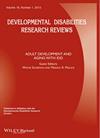Scott S. Hall
{"title":"Treatments for fragile X syndrome: A closer look at the data","authors":"Scott S. Hall","doi":"10.1002/ddrr.78","DOIUrl":null,"url":null,"abstract":"<p>Research into the determinants and developmental course of fragile X syndrome (FXS) has made remarkable progress over the last 25 years. However, treatments to ameliorate the symptoms of FXS have been less forthcoming. While there is optimism in the field that the pace of intervention research is quickening, there has been a bias toward psychopharmacological approaches to treatment. A closer look at the data from those investigations reveals a paucity of evidence that medications can improve intellectual and adaptive functioning in FXS, or decrease associated behavioral and/or emotional issues. Work in other related disorders (e.g., autism) has shown that dramatic improvements in intellectual and adaptive functioning, as well as behavioral and emotional problems, can occur if intensive behavioral treatment is begun early in the child's life. It is hoped that future research efforts will evaluate these intensive early intervention strategies in children with FXS, perhaps in combination with pharmacological approaches. © 2009 Wiley-Liss, Inc. Dev Disabil Res Rev 2009;15:353–360.</p>","PeriodicalId":55176,"journal":{"name":"Developmental Disabilities Research Reviews","volume":"15 4","pages":"353-360"},"PeriodicalIF":0.0000,"publicationDate":"2009-12-15","publicationTypes":"Journal Article","fieldsOfStudy":null,"isOpenAccess":false,"openAccessPdf":"https://sci-hub-pdf.com/10.1002/ddrr.78","citationCount":"54","resultStr":null,"platform":"Semanticscholar","paperid":null,"PeriodicalName":"Developmental Disabilities Research Reviews","FirstCategoryId":"1085","ListUrlMain":"https://onlinelibrary.wiley.com/doi/10.1002/ddrr.78","RegionNum":0,"RegionCategory":null,"ArticlePicture":[],"TitleCN":null,"AbstractTextCN":null,"PMCID":null,"EPubDate":"","PubModel":"","JCR":"","JCRName":"","Score":null,"Total":0}
引用次数: 54
Abstract
Research into the determinants and developmental course of fragile X syndrome (FXS) has made remarkable progress over the last 25 years. However, treatments to ameliorate the symptoms of FXS have been less forthcoming. While there is optimism in the field that the pace of intervention research is quickening, there has been a bias toward psychopharmacological approaches to treatment. A closer look at the data from those investigations reveals a paucity of evidence that medications can improve intellectual and adaptive functioning in FXS, or decrease associated behavioral and/or emotional issues. Work in other related disorders (e.g., autism) has shown that dramatic improvements in intellectual and adaptive functioning, as well as behavioral and emotional problems, can occur if intensive behavioral treatment is begun early in the child's life. It is hoped that future research efforts will evaluate these intensive early intervention strategies in children with FXS, perhaps in combination with pharmacological approaches. © 2009 Wiley-Liss, Inc. Dev Disabil Res Rev 2009;15:353–360.
脆性X染色体综合征的治疗方法:近距离观察数据
在过去的25年里,对脆性X综合征(FXS)的决定因素和发育过程的研究取得了显著进展。然而,改善FXS症状的治疗方法尚未出现。虽然该领域对干预研究的步伐正在加快持乐观态度,但一直存在对精神药理学治疗方法的偏见。仔细研究这些调查的数据就会发现,缺乏证据表明药物可以改善FXS的智力和适应功能,或减少相关的行为和/或情绪问题。对其他相关疾病(如自闭症)的研究表明,如果在儿童早期就开始强化行为治疗,智力和适应功能以及行为和情绪问题都会有显著改善。希望未来的研究工作能够评估FXS儿童的这些强化早期干预策略,也许可以结合药理学方法。©2009 Wiley-Liss, Inc。Dev - disability Res, 2009; 15:353-360。
本文章由计算机程序翻译,如有差异,请以英文原文为准。

 求助内容:
求助内容: 应助结果提醒方式:
应助结果提醒方式:


